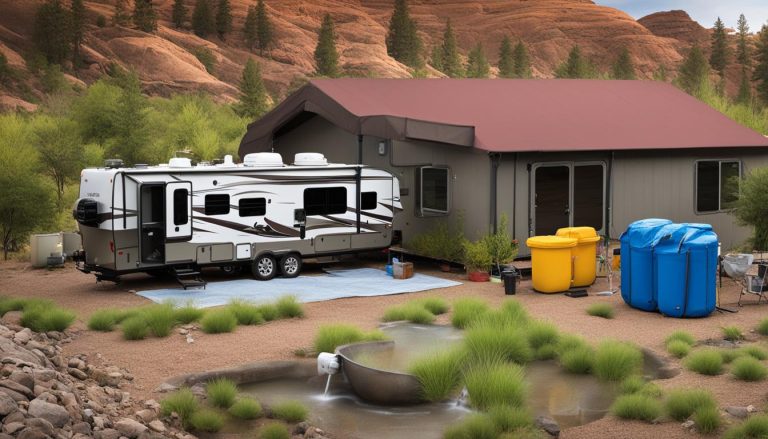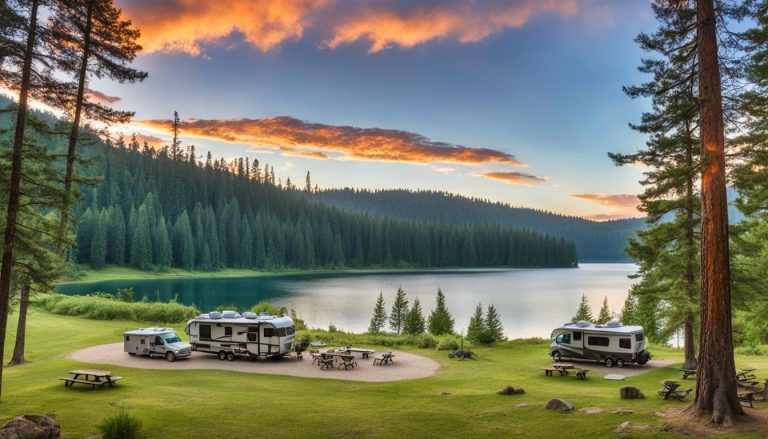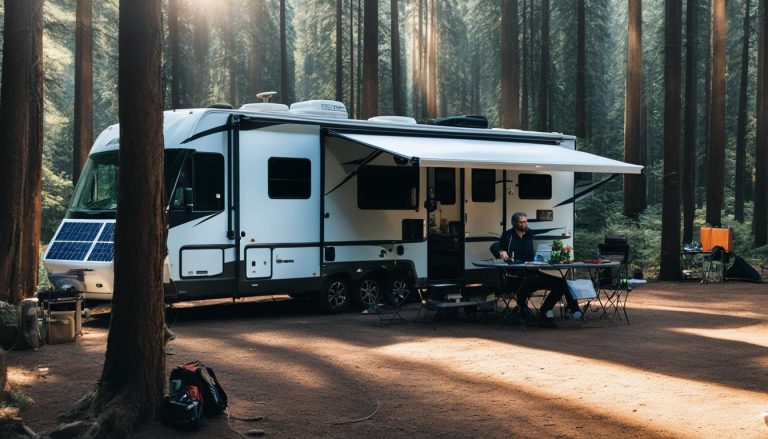What Is an RV Refrigerator? Exploring the Essentials of RV Refrigerators
gorvlifestyle.com and its partners may earn a commission if you purchase a product through one of our links
An RV refrigerator is a vital component of your RV, allowing you to keep your food cool and fresh while you travel on the road. It’s important to understand the different types of RV refrigerators and how they function to ensure efficient operation and proper maintenance.
There are two main types of RV refrigerators: compressor refrigerators and absorption refrigerators. Compressor refrigerators work similarly to household refrigerators, using a compressor and refrigerant to cool the interior. On the other hand, absorption refrigerators utilize chemicals such as ammonia and hydrogen to create a cooling effect through a flash freezing process.
Understanding the distinctions between these types of RV refrigerators will enable you to troubleshoot any issues and keep your refrigerator running smoothly. Whether it’s selecting the appropriate type of refrigerator, performing maintenance tasks, or troubleshooting problems, being well-informed about your RV refrigerator is crucial for an enjoyable and hassle-free camping experience.
Key Takeaways:
- An RV refrigerator is an essential part of your RV, keeping food cool while you’re on the road.
- There are two main types of RV refrigerators: compressor refrigerators and absorption refrigerators.
- Compressor refrigerators use a compressor and refrigerant, while absorption refrigerators use chemicals like ammonia and hydrogen.
- Understanding the different types of RV refrigerators will help you troubleshoot issues and maintain your refrigerator effectively.
- Proper maintenance and regular troubleshooting are essential for keeping your RV refrigerator in optimal working condition.
How Does an RV Refrigerator Work? Exploring the Cooling Mechanisms
An RV refrigerator works differently than a household refrigerator. Understanding the cooling mechanisms of an RV refrigerator is essential to troubleshoot any cooling issues and ensure optimal performance. There are two main types of RV refrigerators: compressor refrigerators and absorption refrigerators.
Compressor refrigerators utilize a compressor and refrigerant to cool the interior, providing separate temperature control for the freezer and refrigerator compartments. This mechanism is similar to that of a standard household refrigerator, making it easier to understand and troubleshoot any potential problems.
Absorption refrigerators, on the other hand, use a different method to achieve cooling. These refrigerators rely on chemicals like ammonia and hydrogen to create a cooling effect through a flash freezing process. While this mechanism may seem more complex, it is equally important to understand for troubleshooting purposes.
To visually illustrate the differences between the two cooling mechanisms, refer to the following table:
| Compressor Refrigerators | Absorption Refrigerators |
|---|---|
| Utilizes a compressor and refrigerant | Relies on chemicals like ammonia and hydrogen |
| Separate temperature control for freezer and refrigerator compartments | Flash freezing process for cooling effect |
| Easier to troubleshoot and understand | Requires a deeper understanding for troubleshooting |
Regular maintenance is crucial for the optimal functioning of an RV refrigerator. Cleaning the coils and checking for proper ventilation are essential steps to prevent common issues such as insufficient cooling and ice build-up. Remember to refer to the manufacturer’s guidelines for specific maintenance instructions that suit your RV refrigerator model.
Consult the following image to get a visual representation of an RV refrigerator:
By understanding the cooling mechanisms of your RV refrigerator and performing regular maintenance, you can ensure a reliable and efficient cooling system for your RV adventures.
Tips for RV Refrigerator Maintenance and Repair
Proper maintenance is crucial for ensuring that your RV refrigerator functions efficiently and reliably. By following these maintenance tips, you can keep your refrigerator in good working condition and avoid costly repairs or replacements.
- Clean the Interior and Exterior: Regularly clean the interior of your RV refrigerator to remove any spills or food debris. Use mild soap and warm water to wipe down the shelves, walls, and door gaskets. Additionally, clean the exterior of the refrigerator using a gentle cleanser and a soft cloth.
- Inspect the Seals: Check the seals and gaskets of your refrigerator regularly for any signs of wear or damage. Damaged seals can lead to poor cooling efficiency and energy waste. If you notice any cracks or gaps, consider replacing the seals to maintain a tight seal and optimize cooling performance.
- Defrost the Freezer: If your refrigerator has a freezer compartment, make sure to defrost it regularly to prevent ice build-up. Ice accumulation can restrict airflow and hinder the cooling process. Follow the manufacturer’s guidelines on defrosting procedures.
- Ensure Proper Ventilation and Airflow: Adequate ventilation and airflow are essential for the optimal performance of your RV refrigerator. Make sure there is sufficient space around the refrigerator for air to circulate freely. Check for any obstructions such as dust, debris, or blockages in the ventilation system, and clean or remove them as needed.
When it comes to repairs, it is recommended to seek professional assistance or consult the manufacturer’s guidelines for specific troubleshooting steps. Attempting to repair complex issues without the necessary expertise can worsen the problem or even cause further damage. For minor repairs or adjustments, you can refer to the manufacturer’s manual, which often includes troubleshooting tips and solutions for common problems.
Choosing the best RV refrigerator for your needs is also crucial for ensuring reliable and efficient cooling in your RV. Consider factors such as size, energy efficiency, storage capacity, and additional features that align with your requirements. Research different brands and models, read reviews and ratings, and consult with experts or fellow RVers to make an informed decision.
By following these maintenance tips and seeking professional help when needed, you can enjoy a well-functioning RV refrigerator that keeps your food fresh and helps make your RV adventures more enjoyable.
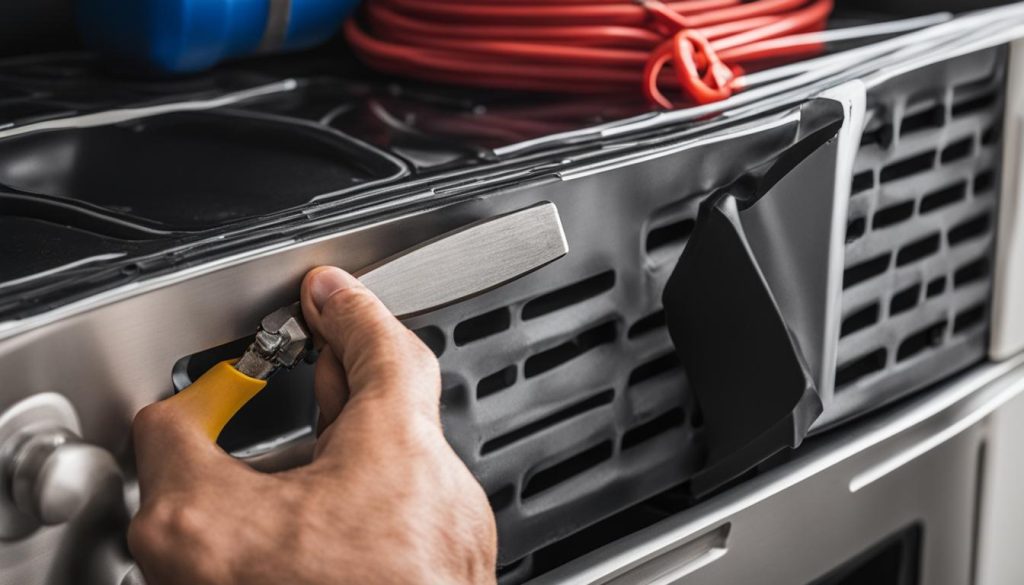
Common Issues and Troubleshooting for RV Refrigerators
While RV refrigerators are designed to provide reliable cooling for your travels, they can experience common issues that may require troubleshooting and repair. Familiarizing yourself with these common problems and their solutions can save you time and frustration on the road.
Insufficient Cooling
One of the most common issues with RV refrigerators is insufficient cooling. If your refrigerator is not cooling properly, there are a few troubleshooting steps you can take:
- Check the power supply to ensure it is connected and functioning correctly.
- Verify that the refrigerator has proper ventilation and airflow around it. Overheating can cause cooling inefficiency.
- Inspect the seals and gaskets on the refrigerator door to ensure they are intact and sealing tightly.
- Adjust the temperature settings to ensure they are set appropriately for your desired cooling level.
Ice Build-Up
Ice build-up in the refrigerator can lead to reduced cooling performance and limited storage space. To address this issue, follow these steps:
- Check the defrosting mechanism and ensure it is functioning correctly. Some RV refrigerators require manual defrosting periodically.
- Inspect the door seals for any gaps or damage that may be allowing warm air to enter, causing excess moisture and ice formation.
- Regularly remove any ice accumulation to maintain proper airflow and cooling efficiency.
Leaking
If you notice water pooling inside or around your RV refrigerator, it may be due to a leaking issue. Follow these troubleshooting steps:
- Inspect the water lines and connections for any leaks or loose fittings.
- Check the drain pan and drain tube for blockages or damage. Clear any debris or obstructions that may be causing the leak.
- Ensure the refrigerator is level. Uneven positioning can cause water to accumulate and leak.
Irregular Temperature Control
When your RV refrigerator cannot maintain a consistent temperature, it can affect the freshness and safety of your stored food. For temperature control issues, try the following:
- Verify that the refrigerator is properly leveled. Uneven positioning can disrupt the cooling process.
- Check the temperature settings and adjust them as needed. Keep in mind that extreme outside temperatures can impact the performance of the refrigerator.
- Inspect the thermostat for any malfunctions or inaccuracies. If necessary, replace the thermostat to restore temperature control.
Remember, if these troubleshooting steps do not resolve the issue or you are unsure about performing repairs yourself, it is advisable to consult a professional technician or refer to the manufacturer’s guidelines for specific troubleshooting steps. Regular maintenance, including cleaning the refrigerator and following best practices, can help minimize these common issues and ensure a reliable and efficient RV refrigerator.
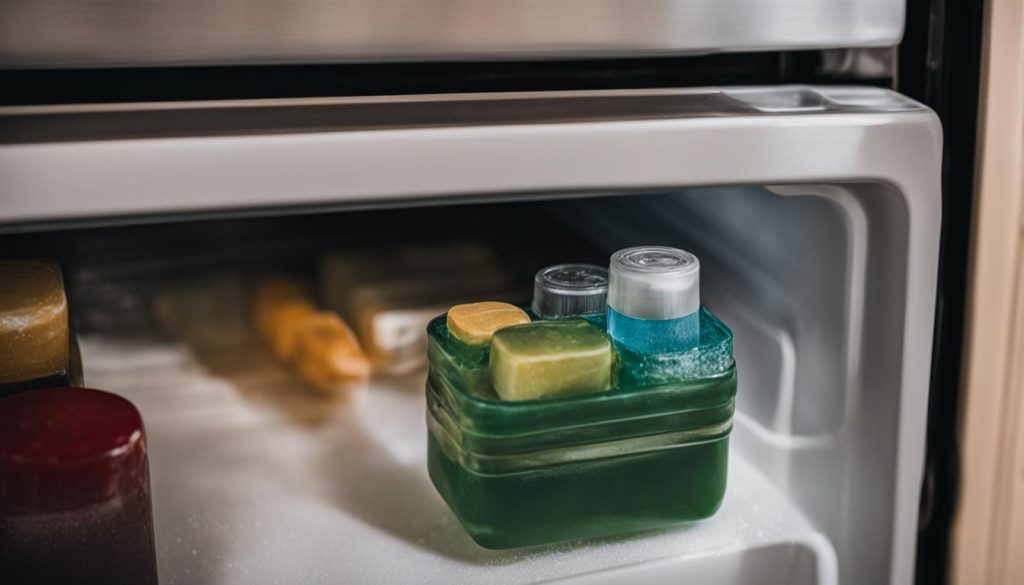
Tips for Efficient Use of Your RV Refrigerator
Efficient use of your RV refrigerator is key to maximizing its lifespan and ensuring optimal cooling performance. By following these simple tips, you can make the most of your RV fridge while minimizing energy consumption and potential maintenance issues.
- Avoid overpacking the refrigerator: While it may be tempting to stock up on groceries, overloading your RV fridge can hinder air circulation and strain the cooling system. Be mindful of the storage capacity and prioritize essential items.
- Allow air circulation between food items: Arrange your food items in a way that allows for proper airflow, helping to maintain consistent temperatures throughout the refrigerator. Avoid tightly packed shelves or blocking the vents.
- Keep the doors shut as much as possible: Every time you open the refrigerator door, warm air enters, causing the cooling system to work harder. Minimize heat and moisture entry by keeping the doors closed when not in use.
- Defrost the freezer when necessary: Ice buildup can negatively impact the efficiency of your RV refrigerator. Regularly defrost the freezer to prevent excessive ice accumulation and ensure proper cooling.
- Park your RV in shaded areas: Direct sunlight can increase the strain on your RV refrigerator, especially during hot summer days. Whenever possible, park your RV in shaded areas to reduce the overall load on the cooling system.
Choosing the best RV refrigerator for your needs and taking into consideration energy-saving features and sizing can significantly contribute to efficient operation and minimize energy consumption while on the road.
Remember, proper maintenance and efficient use go hand in hand. By implementing these tips, you can enjoy a reliable and efficient RV refrigerator throughout your adventures.
Essential Safety Considerations for RV Refrigerators
Safety should always be a top priority when it comes to your RV refrigerator. By following a few essential safety guidelines, you can ensure the well-being of your RV and everyone in it.
First and foremost, proper ventilation and airflow around the refrigerator are crucial to prevent overheating and potential fire hazards. Make sure that the refrigerator has enough space for air to circulate freely, allowing it to operate efficiently and safely.
If you have a propane-powered absorption refrigerator, it requires extra caution due to the presence of an open flame. To mitigate any risks, it is strongly recommended to avoid running the refrigerator on propane while driving. The movement and vibrations can disrupt the flame, posing potential hazards. Instead, opt for pre-chilling your refrigerator before hitting the road and switch to a different power source, such as electricity or battery power, when driving.
Additionally, you should always be mindful of the position of the flame within the refrigerator and its potential impact on the surrounding components. Ensure that there are no flammable materials or objects placed near the burner assembly, as this can increase the risk of fire.
Regular maintenance is crucial for the safe operation of your RV refrigerator. It is important to regularly check for gas leaks by using a soapy water solution on all connections and fittings. If you notice any bubbles forming, it indicates a gas leak, and immediate action should be taken. Furthermore, inspecting the burner assembly for any signs of damage or corrosion is essential to prevent malfunction and accidents.
In summary, prioritize safety by maintaining proper ventilation, avoiding running the propane refrigerator while driving, and conducting regular maintenance checks for gas leaks and burner assembly performance. By adhering to these safety precautions, you can enjoy the convenience of your RV refrigerator while minimizing the risks associated with its operation.
Choosing the Right RV Refrigerator for Your Needs
When it comes to selecting the perfect RV refrigerator, several factors play a crucial role in ensuring optimal cooling performance and convenience. By considering these key aspects, you can make an informed decision that suits your specific needs and enhances your overall RV experience.
The first thing to consider is the size and capacity of the RV refrigerator. Assess the available space in your RV and determine the appropriate dimensions that fit seamlessly into your setup. Additionally, consider the amount of food and beverages you typically store to find the right capacity that accommodates your needs without overcrowding or wasting space.
Energy efficiency is another important consideration. Look for RV refrigerators that are designed to be energy-saving, as this can help minimize power consumption while on the road and extend the lifespan of your RV’s battery. Investing in an efficient RV refrigerator allows you to enjoy long trips without worrying about excessive power drain.
Next, think about the power source options. RV refrigerators can be powered by propane, electricity, or both (dual-power). Each option has its own advantages and considerations. Propane-powered refrigerators provide flexibility and autonomy, while electric models are convenient for RV sites with hookups. Dual-power refrigerators offer the best of both worlds, allowing you to switch between propane and electricity as needed. Choose the power source that aligns with your camping style and preferences.
Lastly, consider additional features that can enhance your RV refrigerator experience. Some models come with built-in ice makers, adjustable shelves, or other customization options to suit your specific storage needs. Research different brands and models, read online reviews and ratings, and seek advice from seasoned RVers or experts to narrow down the options and choose the best RV refrigerator that meets all of your requirements.
FAQ
What is an RV refrigerator?
An RV refrigerator is an essential part of an RV that allows you to store and keep your food cool while on the road.
How does an RV refrigerator work?
RV refrigerators work differently than household refrigerators. Compressor refrigerators use a compressor and refrigerant to cool the interior, while absorption refrigerators use chemicals like ammonia and hydrogen to create a cooling effect through a flash freezing process.
What are some tips for RV refrigerator maintenance and repair?
Regular maintenance is important for keeping your RV refrigerator running smoothly. Some tips include cleaning the interior and exterior, inspecting seals for wear, defrosting when necessary, and ensuring proper ventilation and airflow.
What are common issues and troubleshooting steps for RV refrigerators?
Common issues with RV refrigerators include insufficient cooling, ice build-up, leaking, and irregular temperature control. Troubleshooting steps may involve checking power supply, ventilation, seals, and adjusting temperature settings.
What are some tips for efficient use of an RV refrigerator?
Efficient use of an RV refrigerator includes avoiding overpacking, allowing air circulation, minimizing heat and moisture entry by keeping doors shut, defrosting when necessary, and parking in shaded areas to reduce strain on the refrigerator.
What are essential safety considerations for RV refrigerators?
Proper ventilation and airflow are important for preventing overheating and potential fire hazards. It is also crucial to exercise caution with propane-powered absorption refrigerators and regularly check for gas leaks and inspect the burner assembly.
How do I choose the right RV refrigerator for my needs?
When choosing an RV refrigerator, consider factors such as size, capacity, energy efficiency, power source, and additional features. Assess your specific needs, research different brands and models, and read reviews to make an informed decision.

